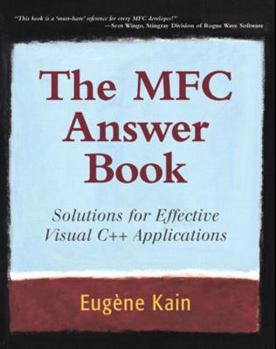MFC Answer Book: Solutions for Effective Visual C++ Applications
Customer Reviews
Rated 5 starsGreat reference for stressed MFC programmer
This book is written in a question and answer format, just like a FAQ. Although the content predominantly revolves around documents and views, many other common questions are also answered. Personally, I love the format and the content. I hate having to weed through several huge books to find an answer to a simple question. I loaned out my previous copy, and it wasn't returned. I ended up buying another copy.While this...
0Report
Rated 5 starsExcellent walkthrough
I have EVERY bible on MFC. professional mfc, windows withh mfc visual c++ inside but I found this book the most valuable. Instead of bombarding you with jargon and theorie this book can help you learn a lot better than others, for a great deal i do not care about mfc internals casue I DO NOT HAVE THE TIME to learn everything MFC is suppposed to be a library to USE not to completle dissect , sometimes you just have to accept...
0Report
Rated 5 starsEver wondered how to do this with MFC
Audience: Intermediate and above.Chapter 0 - Terminology and ConventionsChapter 1 - Document/View Architecture BackgrounderChapter 2 - Documents and Document Templates- Managing Document Templates- Managing Documents- Managing the Recent Files list (MRU)- Miscellaneous ItemsChapter 3 - Views and Frame Windows- General Topics- Opening and Closing Views and Frame Windows- Managing Sizes and Positions- Managing Caption, Icons,...
0Report
Rated 5 starsShould be in every MFC programmer's library
I now own four Visual C++ books, and after a year or so of programming with MFC, this is often the book I turn to first. When you've used MFC for a while, you realize that if your application fits exactly into the mold forseen by the MFC programmers, your job is a snap. But I've never had an application quite like that. There is always something that has to be different from the straight-and-narrow path. This book is...
0Report
Rated 5 starsOne of the best, a must read for serious developers.
The "MFC Answer Book" is an excellent book that explainshow to implement advanced features that you find in many Windowsapplications. The author does not just give you code to implement the features, but clearly explains why and how the code works. Most importantly, he explains many important concepts of the MFC application framework. For example, he gives an excellent explanation of the Document/View architecture. Within...
0Report





















